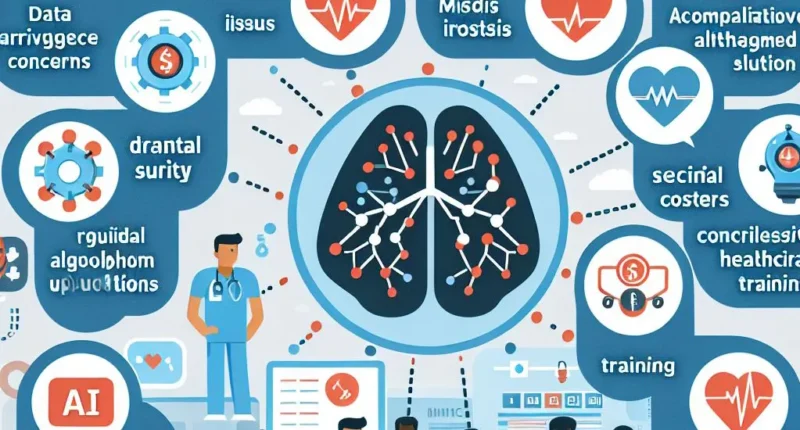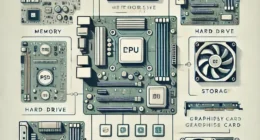Artificial intelligence (AI) is transforming healthcare. It helps doctors diagnose diseases, plan treatments, and manage patient records. AI can also predict patient outcomes and streamline administrative tasks. However, despite these benefits, AI has several drawbacks in healthcare. These challenges need to be addressed to fully harness its potential. In this article, we will explore the major drawbacks of AI in healthcare and discuss possible solutions.
Table of Contents
- Data Privacy Issues Drawbacks of artificial intelligence and their potential solutions in the healthcare sector
- Bias Drawbacks in artificial intelligence and their potential solutions in the healthcare sector
- High Implementation Costs Drawbacks of artificial intelligence and their potential solutions in the healthcare sector
- Loss of Human Touch in Care Drawbacks of artificial intelligence and their potential solutions in the healthcare sector
- Complexity and Lack of Transparency Drawbacks of artificial intelligence and their potential solutions in the healthcare sector
- Job Displacement Concerns Drawbacks of artificial intelligence and their potential solutions in the healthcare sector
- Dependence on High-Quality Data Drawbacks of artificial intelligence and their potential solutions in the healthcare sector
- Ethical Dilemmas Drawbacks of artificial intelligence and their potential solutions in the healthcare sector
- Regulatory and Legal Challenges Drawbacks of artificial intelligence and their potential solutions in the healthcare sector
- Conclusion
Data Privacy Issues Drawbacks of artificial intelligence and their potential solutions in the healthcare sector
AI in healthcare relies on large amounts of patient data. This data often includes personal information like medical history, treatment details, and genetic information. The more data AI systems use, the better they perform. But this raises concerns about patient privacy. If data is mishandled or leaked, it could expose patients to identity theft or other security risks. Protecting this data is one of the biggest challenges AI faces in healthcare.
Solution: Healthcare organizations need to use stronger security measures. Encryption can help protect data from unauthorized access. Hospitals and clinics should also follow strict privacy policies when sharing data with AI developers. A solution known as “federated learning” can also help. It allows AI systems to learn from data without having access to the actual data itself. This way, patient data stays private.
Bias Drawbacks in artificial intelligence and their potential solutions in the healthcare sector
AI systems learn from the data they are trained on. If this data is biased, the AI will produce biased results. For example, if an AI system is trained mostly on data from one demographic group, it may not work well for others. In healthcare, this bias could lead to misdiagnoses or ineffective treatments, especially for minority populations. Bias in AI can lead to unfair outcomes in patient care.
Solution: To solve this, healthcare providers must ensure that the data used to train AI is diverse. It should represent different ages, genders, races, and ethnic groups. Regular reviews of AI algorithms are also necessary to check for biases. Healthcare organizations should work with AI developers to identify and fix these issues as early as possible.
High Implementation Costs Drawbacks of artificial intelligence and their potential solutions in the healthcare sector
AI technology is expensive to develop and implement. Hospitals need to invest in the infrastructure to support AI, such as new software, data storage, and training for staff. Smaller hospitals or clinics may not have the financial resources to adopt AI. This creates inequality in access to AI-driven care. High costs can limit the widespread use of AI in healthcare, especially in rural or low-income areas.
Solution: Governments can help by providing funding or subsidies for healthcare facilities that want to adopt AI. Public-private partnerships can also lower costs. Additionally, using open-source AI tools can make the technology more affordable. Healthcare organizations can start with smaller, less expensive AI projects and gradually scale up as they gain experience.
Loss of Human Touch in Care Drawbacks of artificial intelligence and their potential solutions in the healthcare sector
AI can automate many tasks in healthcare, such as diagnosing conditions, analyzing medical images, or managing patient data. While this improves efficiency, it reduces the human interaction patients expect from their doctors. Patients may feel disconnected from the healthcare system if they interact with machines instead of human caregivers. Emotional support is a critical part of healthcare that AI cannot provide.
Solution: AI should be used to assist healthcare professionals, not replace them. AI can handle routine tasks, freeing up doctors and nurses to spend more time with their patients. This allows healthcare providers to focus on providing personalized care and emotional support. AI can enhance the efficiency of healthcare, but the human element must remain central.
Complexity and Lack of Transparency Drawbacks of artificial intelligence and their potential solutions in the healthcare sector
AI systems can sometimes be difficult to understand. They often work as “black boxes,” meaning it’s hard to know how they arrive at certain decisions. In healthcare, doctors and patients need to trust the technology that’s being used. If they don’t understand how AI makes decisions, they may hesitate to use it. This lack of transparency can slow down the adoption of AI in healthcare.
Solution: Developers need to focus on creating more explainable AI systems. These systems should provide clear reasons for their decisions. This will help healthcare professionals understand and trust AI recommendations. Regulatory bodies should also develop standards for transparency in AI. When AI systems are clear and understandable, doctors can use them more confidently in patient care.
Job Displacement Concerns Drawbacks of artificial intelligence and their potential solutions in the healthcare sector
AI is capable of performing many tasks traditionally done by humans. This includes administrative work, data analysis, and even some diagnostic tasks. As AI becomes more common, healthcare workers may worry about losing their jobs. Administrative staff, in particular, could be at risk as AI automates routine tasks. Job displacement is a valid concern, but it can be managed with proper planning.
Solution: AI should be viewed as a tool to assist healthcare workers, not replace them. By automating repetitive tasks, AI can allow workers to focus on more meaningful tasks that require human judgment. Healthcare workers should also receive training on how to work alongside AI. Upskilling staff to manage AI systems and perform higher-level tasks can help reduce job displacement fears.
Dependence on High-Quality Data Drawbacks of artificial intelligence and their potential solutions in the healthcare sector
AI systems need high-quality data to work effectively. In healthcare, this means having accurate, complete, and well-organized patient records. Unfortunately, many healthcare organizations still rely on outdated data systems. Inconsistent data or missing information can lead to incorrect AI predictions or diagnoses. The quality of data is crucial for the success of AI in healthcare.
Solution: Healthcare providers should invest in modern electronic health record (EHR) systems. These systems need to be standardized and easy to use, ensuring that the data they collect is accurate and comprehensive. Regular data audits should also be performed to ensure quality. Improving data collection and management processes will lead to more reliable AI performance.
Ethical Dilemmas Drawbacks of artificial intelligence and their potential solutions in the healthcare sector
AI raises many ethical questions in healthcare. For example, who is responsible when an AI system makes an incorrect diagnosis? What happens if AI algorithms prioritize certain patients over others? Patients might also feel uneasy about AI making life-or-death decisions in critical situations. These ethical concerns need to be addressed before AI can be widely accepted in healthcare.
Solution: Clear ethical guidelines are necessary for using AI in healthcare. Patients should always be informed when AI is involved in their care and given the opportunity to consent. Healthcare providers need to ensure that AI is used responsibly and ethically. Regulatory bodies can develop frameworks to govern the use of AI in healthcare, ensuring that patient rights are respected.
Regulatory and Legal Challenges Drawbacks of artificial intelligence and their potential solutions in the healthcare sector
AI in healthcare is advancing rapidly, but regulations have not kept pace. Without clear rules, it can be challenging to ensure that AI systems are safe and reliable. There are also legal questions about accountability when AI makes mistakes. If an AI system gives the wrong diagnosis, who is to blame? Is it the hospital, the AI developer, or the healthcare provider?
Solution: Governments need to establish clear regulations for the use of AI in healthcare. These regulations should cover safety standards, testing procedures, and accountability measures. Legal frameworks should also be updated to address liability in cases where AI systems fail. Clear regulations will help build trust in AI and ensure that it is used safely and effectively in healthcare.
Conclusion
Artificial intelligence holds great promise for improving healthcare. It can enhance diagnosis, treatment planning, and patient management. However, there are significant drawbacks that need to be addressed. Issues like data privacy, bias, and high costs present challenges. Ethical concerns, lack of transparency, and the threat of job displacement also need to be resolved.
By focusing on solutions—such as stronger data security, diverse training data, lower-cost AI systems, and better transparency—healthcare providers can fully unlock the benefits of AI. With the right approach, AI can become a powerful tool that complements human healthcare workers and improves patient outcomes.









